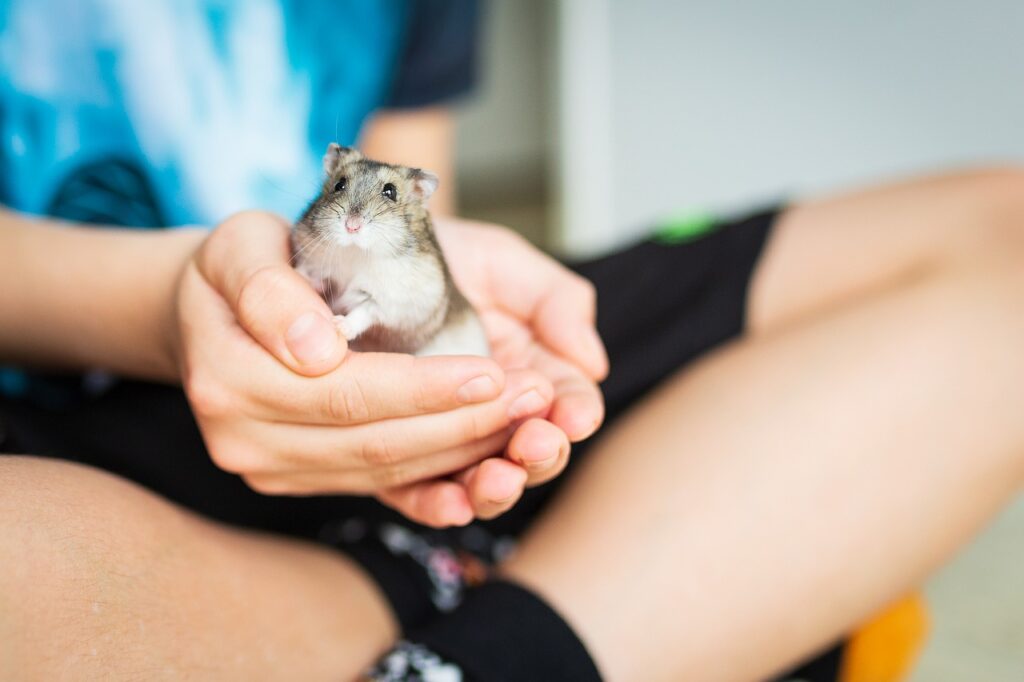Many people ask: "Are hamsters good pets for kids?" Hamsters are small, furry and can be perfect starter pets. They come in many different breeds that make them suitable for certain types of homes. But before you get a hamster for kids, there are several things to consider.

Are hamsters kid-friendly? Of course, it depends on your child. Some kids are naturally gentle and will treat the hamster with care while others might not handle pet ownership as responsibly or be able to follow directions.
Hamsters can make great pets for children who love taking good care of their things, following rules and playing independently (or with an adult). They are not a good choice for children who play roughly, can't follow directions or don't like to clean up after themselves.
When deciding if the hamster is kid-friendly, you should consider:
Hamsters can be a great family pet, but there are a few things to consider before getting one. First, make sure you have enough space for the hamster's cage - it needs room to run around outside of the cage as well as in. Also, think about your child's habits and if they seem compatible with owning a hamster - some hamsters need to be handled often while others don't. Finally, research the different hamster breeds to see if one might fit your family better than another - for example, Syrian hamsters are bigger and tend to live alone while Chinese hamsters and Robos hamsters are smaller and more active. So, before getting a hamster, ask yourself these questions and if you can answer yes to most of them, go ahead and get one! They make great pets for kids!
So, you’re thinking of getting a hamster and want to know what the different breeds are? Well, read on! There are quite a few breeds, like Golden hamsters or Dwarf Campbell Russian hamsters, so it is important that you do your research before deciding which one is right for you and your family. Here are some of the most popular breeds of hamsters.
The Syrian hamster or Golden hamster is the largest breed of hamster and can grow up to six inches long. They have a brown coat with black stripes and are best suited for experienced pet owners. The Syrian is a tough breed that's unlikely to get injured by clumsy hands. However, they have a short lifespan which can be from two to three years.
The Dwarf hamster is the smallest breed of hamster and typically grows no more than four inches in length. They come in many different colours including white, black, beige, and hamster. Dwarf hamsters are the best choice for children as they are easy to handle and less prone to biting.
The Roborovski hamster is a very small breed of hamster that only grows to about two inches long. They have a sandy-coloured coat with brown markings and are known for being one of the most active breeds of hamsters.
The Chinese hamster is a medium-sized breed of hamster that can grow up to four inches in length. They have a black and white coat with a banded tail and are considered to be one of the more docile breeds of hamster.
Campbell Russian hamster is a small breed of hamster that typically grows to three inches in length. They have a brown and white coat with black markings and are one of the most popular breeds of hamsters.
This is a difficult question to answer as it depends on what you are looking for in a pet. Hamsters are smaller and cheaper than guinea pigs, but they require more space and can be more active. Guinea pigs are larger and slower than hamsters, but they make better pets for children as they are less prone to biting. Ultimately, the decision comes down to personal preference.
Hamsters do not necessarily need a lot of exercises, but they do enjoy playing and running around. A large enough cage with plenty of toys will satisfy most hamsters' needs.
Two hamsters can get along together if they are introduced properly, but it is not recommended to keep more than one hamster in a cage as they will compete for food and space.
Some good alternatives to hamsters are gerbils, mice, rats and other rodents. These popular pets are all typically small and easy to handle, and they each have their own unique personality. Do your research before deciding on a pet to make sure it is the right fit for your family.
Hamsters are omnivorous animals and can eat a variety of things including fruits, vegetables, seeds, nuts, and other small animals. It is important to provide your hamster with a healthy diet to ensure they stay healthy and active.
This is a common misconception, but it is not true that male hamsters are more aggressive than female hamsters. All hamsters can be territorial and may become aggressive if they feel threatened. It is important to properly introduce any new pets to your existing hamster to avoid any problems.
Female hamsters typically do better when they have a companion, but male hamsters can also live happily alone. It is important to watch for signs of aggression between the animals and to provide enough space for each hamster to avoid any conflicts. Ultimately, it is up to you whether or not to get your hamster a partner.
Hamsters are not known to be aggressive towards humans, but they can bite if they feel threatened. It is important to always handle your hamster with caution and never attempt to pick them up by their tail as this can cause injury.

Hi! My name is Olga and I'm a bit of an animal lover. I've had several small pet animals through the years and I've learned a lot about them - from caring for them, to understand their behavior.
I'm a fan of rabbits, hamsters, and guinea pigs in particular, but I also love visiting rescue centers to learn more about other furry friends. It's amazing how much personality these little creatures can have - they're certainly not just "cute" animals!